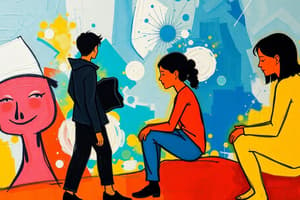Podcast
Questions and Answers
During adolescence, what fears typically center on?
During adolescence, what fears typically center on?
- Travel, languages, food, cultural differences
- Climate change, global politics, technology advancements
- Sports, hobbies, academics, friendships
- Physical appearance, sex, social status, vocation (correct)
Which age group experiences depression, restlessness, and anxiety as common characteristics?
Which age group experiences depression, restlessness, and anxiety as common characteristics?
- Middle age (40-65 years) (correct)
- Adolescence
- Young adulthood (18-21 to 40 years)
- Old Age (65+)
What is an expected behavior of socially rejected children during puberty with disabilities?
What is an expected behavior of socially rejected children during puberty with disabilities?
- Have no impact on their ego development
- Display extreme aggressiveness towards others
- Begin to develop behaviors to protect their egos (correct)
- Lead social groups with confidence
Which group is known to engage in less premarital sex during adolescence?
Which group is known to engage in less premarital sex during adolescence?
What does the text mention about the formation of cliques during adolescence?
What does the text mention about the formation of cliques during adolescence?
What is common during old age for those with disabilities according to the text?
What is common during old age for those with disabilities according to the text?
During which stage of Erikson's life stages does a child typically experience the conflict of Trust vs. Mistrust?
During which stage of Erikson's life stages does a child typically experience the conflict of Trust vs. Mistrust?
In Piaget's stages of intellectual development, at what age range does a child typically go through the Concrete operational stage?
In Piaget's stages of intellectual development, at what age range does a child typically go through the Concrete operational stage?
During preadolescence or puberty, what is one of the key characteristics that starts to develop in individuals around ages 10-12?
During preadolescence or puberty, what is one of the key characteristics that starts to develop in individuals around ages 10-12?
In childhood, what is a common characteristic of overprotective environments towards children?
In childhood, what is a common characteristic of overprotective environments towards children?
During middle childhood (ages 6-12), what is a significant challenge that children in this stage may face with regards to relationships?
During middle childhood (ages 6-12), what is a significant challenge that children in this stage may face with regards to relationships?
In Erikson's Psychosocial Theory, what is the main conflict experienced during young adulthood in the stage of Intimacy vs. Isolation?
In Erikson's Psychosocial Theory, what is the main conflict experienced during young adulthood in the stage of Intimacy vs. Isolation?
Flashcards are hidden until you start studying
Study Notes
ERIKSON'S LIFE STAGES
- Trust vs. Mistrust: 0-1 year
- Autonomy vs. Doubt: 2-3 years
- Initiative vs. Guilt: 4-5 years
- Industry vs. Inferiority: 6-11 years
- Identity vs. Role Confusion: 12-18 years
- Intimacy vs. Isolation: young adulthood
- Generativity vs. Self-Absorption: middle age
- Integrity vs. Despair: old age
PIAGET'S STAGES OF INTELLECTUAL DEVELOPMENT
- Sensorimotor: 0-2 years
- Preoperational: 2-7 years
- Concrete operational: 7-11 years
- Formal operational: 11+ years
CHILDHOOD
- Rapid growth from birth to five years of age
- Large muscles mature rapidly but aren't under full control
- High level of friendly interactions
- Friends increase between 2-3 years
- Later, closeness of attachment changes
- Kids can identify kids they'd like to play with
MIDDLE CHILDHOOD
- Ages 6-12
- Dominated by gang activities
- Dramatic growth of bones, muscles, and nervous tissue
- Large muscles increase in physical activity
- Physically immobile children often left behind
- Brain and nervous system reach maximum size
- Higher level of intellectual development
- Sexual differences learned
- Need to challenge authority
PREADOLESCENCE OR PUBERTY
- Ages 10-12
- Growth spurt
- Awakening sexuality
- Increase in peer group relationships
- Most rapid body changes except for infancy
- Look down on little children
- Breasts and female hormones develop in girls
- Boys become more muscular and male hormones develop
- Skin blemishes and weight gain
- Social class, age, maturity, and ethnic identity are considered
- Hardest age for socially rejected children
PUBERTY WITH DISABILITIES
- Social meanings of disabilities learned from those closest
- Overprotection can lead to feeling fragile
- Does not prepare for interaction, but prepares for rejection
- Begins to develop behaviors to protect their egos
- Isolation and hostility
ADOLESCENCE
- Puberty to late teens/early 20's
- "Impossible period" between childhood and adulthood
- Fears centering on physical appearance, sex, social status, and vocation
- Maintaining obedience to parents
- Controlling sexual urges
- Selecting a vocation
- Beginning to act as an adult
- Dating and engaging in premarital sex
- Cliques form based on socioeconomic and racial backgrounds
- Reinforcing and strengthening parental values
- Looking to achieve independence in dress, music, and slang
ADULTHOOD
- Young adulthood (18-21 to 40 years)
- Mobility and transition
- Variety of lifestyles
- Middle age (40-65 years)
- Depression, restlessness, irritability, anxiety, and physiological upheaval
- Concern about health and physical appearance
- Security and comfort
- Realization of not obtaining childhood dreams
- Accepting disability or continual depression
- Old age (65+ years)
- Equalizer for those with disabilities
- Physically breaking down
- Psychologically, less proficient
- Social disengagement and alienation common
Studying That Suits You
Use AI to generate personalized quizzes and flashcards to suit your learning preferences.



